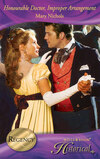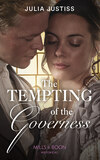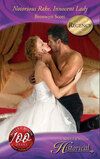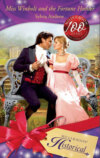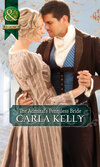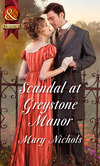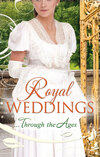Kitabı oku: «Honourable Doctor, Improper Arrangement», sayfa 2
‘Oh, yes, please, and then I must go home. Everyone will be wondering what has become of me.’
He took her all over the house, showing her the dining room, the dormitories, the schoolroom, the infirmary where he treated the sick and the nursery where the tiny infants were looked after by nursemaids. Some were sleeping, some bawling lustily, others, almost too weak to cry, were whimpering. It touched Kate’s soft heart to see them. ‘Are they all abandoned?’ she asked.
‘Most of them. Some are brought in anonymously, others are simply left on the doorstep. Sometimes there is a note attached, telling us the child’s name and why they have been left, sometimes a small memento that has some meaning for the parent. Those little items, most often quite valueless, are often the only means we have of identifying the child and they are carefully preserved in case the mother wants to reclaim her offspring. It is the most heartbreaking side to our work.’
‘How sad.’ She felt the tears pricking her eyes. ‘It must be a terrible decision for any mother to be forced to make.’
‘Yes.’ He led the way back down the stairs to the kitchen and introduced her to some of the other helpers, and even showed her the patch of grass they called a garden and where the smaller children played. ‘The older children are all given their allotted tasks about the place,’ he told her. ‘So we do not have a large staff.’
The children themselves were a mixed bunch. Some were noisy and laughing, others subdued and withdrawn, but all were neatly dressed and well fed. ‘It is the quiet ones I worry about,’ he said. ‘They are the ones who will benefit most from going into a foster home and having a little extra attention.’ He indicated a little girl sitting on the floor in the corner of the classroom intent on playing with a rag doll. ‘This is Annie Smith,’ he said. ‘She is nine years old. I was called to her mother when she fell ill. She could not be nursed at home, so I recommended hospital. Annie’s father cannot look after her because he has to go to work as a docker and there are no other relatives, so she has come here, but as soon as her mother is well again, she will go home. The family is poor, but she was never neglected. She is bewildered by the other children and has found it difficult to settle.’
Kate went over to the child and squatted beside her. ‘Hallo, Annie,’ she said. ‘I am Kate. What do you call your doll?’
‘Dolly.’
‘Of course, how silly of me not to know that.’
The child smiled at that, a wan little smile that told Kate she was missing her parents. She talked to her for several minutes, while Simon looked on. So her name was Kate. She was special, was Mrs Kate Meredith, a born mother, able to relate to children in a way that made them feel comfortable. She made him feel comfortable too. He wondered at that; it was a long time since he had felt at ease in the presence of a woman. He did not know a thing about her, except that she was married and had a taste for novels, judging by the books she carried looped to her wrist by the string.
‘Poor little things,’ she said, as they returned to the front hall. ‘I wish I could do something to help.’
‘We are always short of money…’
‘Oh, I did not mean money, I am afraid I cannot manage more than a small donation. I meant help on a practical level.’
He looked sideways at her. Was that what he had been hoping she would say? She had such a sunny, compassionate nature, she would be an asset to the Society if she became involved. ‘We are always glad of help in whatever form: a few hours at the Home, help with the paperwork, raising funds, fostering. But none of it is easy and it takes up time, so you need to think carefully before committing yourself.’
‘I understand that, and I will think carefully, I promise.’
‘Good. Now, if you have seen all you wish to see, I will escort you home.’
‘Oh, do not trouble yourself,’ she said. ‘I can walk.’
‘Not to be thought of,’ he said. He had no idea what sort of home she came from, but she was well dressed and well spoken and should not be left to find her own way through the poorer streets of the city, not after sticking to him like a leech all afternoon. He realised, with a jolt, that he had enjoyed every minute of it. ‘I have my gig nearby. It is no trouble at all.’ He picked up a bell from the table and gave it a sharp shake. It was answered by an urchin of perhaps twelve years old, whom he sent to the stables to have the vehicle brought to the door.
‘But you have no idea where I live, have you?’ she said with a smile. ‘It might be miles away.’
‘All the more reason to see you safely home.’ He paused. ‘Is it miles away?’
She laughed. ‘No. Holles Street.’
He was surprised. Holles Street, though not the most affluent address in the capital, was not far below it, and if he had known that was where she came from, he would never have allowed her to accompany him into the slums, nor taken her to the Home. How shocked she must have been! But she had shown no sign of shock. She had held Joe in her arms for all his filth and had squatted down beside Annie and talked to her without a hint of distaste. Perhaps he had been right in his first assessment of her and she was a nursemaid or governess to a wealthy family. It would account for the address. But if that was so, what had happened to her husband? ‘Not so far, then,’ he said. ‘But it makes no difference, I would be less than a gentleman if I allowed you to walk.’
The boy came back to say the gig was outside the door and Simon conducted her out to it and settled her in her seat before jumping up and taking the reins from the ostler who had brought it round for him.
‘Now,’ he said, ‘shall we go to the library first?’
‘Library?’
‘Was that not where you were going when we met?’
She laughed, holding up her hand with the books dangling from her wrist. ‘I had quite forgotten these. It seems an age ago. No, I think it is a little late and I had better go straight home. My father and grandmother will be wondering where I have got to.’
‘You live with them?’
‘Yes. My father is the Reverend Thomas Morland. I have been living with him since I was widowed four years ago.’
Once again she had surprised him. Not only that she was not a servant, but she did not look old enough to have been married that long ago. She was beginning to confuse him. ‘My condolences, ma’am.’
‘Thank you. We had only been married six months when my husband went away to war and I never saw him again.’ She did not know why she was explaining that to him. It was really nothing to do with him, though he would have to know all about her if she was going to help at the Home, which was an idea that had been growing in her head ever since he had shown her round the place.
‘I am sorry,’ he said. ‘That must have been hard for you.’
‘Yes, it was.’
‘I assumed you were the children’s governess.’
‘Children?’
‘Those you were playing with in the park. Very happy you all looked too.’
‘They are my cousin’s children. Jamie is ten, Charlotte, eight, Henry, six, and little Rosemary is four. I love to take them out when their governess has a day off. They are such a delight to be with.’
‘You have no children of your own?’
‘Sadly, no.’
‘One day, perhaps.’
‘Perhaps.’ She did not want to go into that on so slight an acquaintance. ‘I thought at first that you were a schoolmaster.’
‘Did you? Why?’
‘Because of the competent way you handled little Joe and the strict tone of your voice when you spoke to him.’
‘One has to be firm with children.’
‘Naturally, but not hard or cruel. Their young minds can be so easily bruised.’
‘Oh, indeed. We are at one on that.’
He had first hand experience of bruises, both physical and mental—they had stayed with him all his life. His own governess, Miss Nokes, had been a tyrant who had tried beating his lessons into him. He had soon learned not to complain because his uncle would not believe him and told him, ‘Miss Nokes knows what she is doing. If you misbehave, you must be punished.’ The fact that his back was lacerated and purple with bruising carried no weight at all. ‘It is time you learned to take your punishment like a man. You should be more like Charles. He never complains.’ Simon supposed it was only natural that his uncle should favour his own son over his nephew, but he made no effort to hide it and Simon was left feeling like a cuckoo in the nest.
What the beatings had done for Charles, who was three years older, was to make him as cruel as the governess. He could not take his anger out on the real perpetrator and so he vented it on animals, his horse and dogs, and any wild animals he found. Simon had often nursed an injured animal, binding up its wounds and hiding it until it was well again. He had been glad when he was sent away to school, only to find that was even worse for thrashings, which he endured stoically, while vowing that if and when he had children they would never be beaten.
Strangely enough, it was the army that allowed him to be himself, to find an occupation that gave him fulfilment. The army existed to kill, but on the other hand it offered him comradeship and a purpose to his life, especially when he found his doctoring skills could often make the difference between life and death, between a man being crippled and having a whole body. There had been times when he had not succeeded, but no one blamed him—they knew he was doing all he could.
He had been silent so long that Kate wondered what he was thinking. His expression, so easy and relaxed a few moments before, was severe and uncompromising, his jaw set. Had she said something to upset him? ‘I suppose being a schoolmaster and being a doctor are not so very different when it comes to children,’ she said for want of something to say.
His face relaxed and he smiled, his innate good manners taking over from his grim memories. ‘One looks after the body and the other the mind.’
‘But mind and body are one when it comes to the whole person.’
He laughed suddenly. ‘That is a very profound statement for a summer afternoon, but I suppose having a father who is a Reverend makes you more thoughtful than most.’
‘Perhaps. But he has no parish. He gave it up when—’ She stopped suddenly as if about to utter an indiscretion. ‘When he decided to write a book about comparative religions and needed to be in London close to sources of research and bought the house in Holles Street. My grandmother lives with us. I will introduce you to them….’
‘I am hardly fit to go calling,’ he said, looking down at his clothes, sadly crumpled after dealing with Joe. ‘Perhaps you will allow me to call on you tomorrow afternoon, when I am fit to be presented. And then I can let you know how Joe is settling down,’ he added. Why, when he had decided that women were best kept at a distance, did he suddenly want to learn more about her? She was unsettling him.
‘Yes, I shall look forward to that.’ They were turning into Holles Street. She pointed to one of the houses. ‘That one.’
He pulled up, jumped out to hand her down, doffed his hat and watched as she let herself in the door, then climbed back to go to his lodgings in Piccadilly, musing on the events of the day. Was it fate that brought him to that spot in Hyde Park just in time to help rescue the little urchin? Fate or not, he wanted to see Mrs Meredith again, though he told himself it was only because he wanted to enrol her help for the Society.
Chapter Two
Lady Morland was sitting in the drawing room, a cup of tea in her hand and a plate of sugar plums at her elbow when Kate entered the room. ‘Good heavens, Kate, whatever has happened to you?’ she queried. She was a little plump, due to her partiality for sweetmeats, but was still, at seventy, very active both in mind and body. ‘Have you had an accident? Have you been set upon and robbed?’
‘No, nothing like that. I am sorry I am late, Grandmama, but I have had such an adventure.’
‘You had better tell me at once, for a more bedraggled sight I never did see. It is to be hoped no one of any note saw you or it will be all round town.’
‘Oh, Grandmama, of course it will not. I am not one of the ton, I do not move in such exalted circles, you know that very well.’
‘But you will when the Viscount comes back. He will take you out and about and there must be no hint of gossip. You know how particular he is.’
She did. Viscount Robert Cranford, one-time Colonel of a line regiment and now a diplomat, was very particular indeed, which was why Kate sometimes wondered why he had picked her out for his attention. She had first met him when he called to commiserate with her on Edward’s death. He had known and admired her late husband as a valiant fellow officer and felt he owed it to him to visit his widow. He knew and understood the grief felt on losing a loved one, he had told her; his wife had died, leaving him with two daughters to bring up. They were being cared for by his sister, Mrs Withersfield, on his estate near Cookham. ‘When Harriet’s husband died and left her in rather straitened circumstances,’ he had explained, ‘I offered her a home. It has worked very well because, being so often away from home myself, I needed someone to run the house and look after the girls.’
Her grandmother had plied him with refreshments and invited him to call again. He had done so several times while he was in England; when he went back to Spain, he and Kate had kept up a regular correspondence. After the war ended, he had left the army to pursue a career in the diplomatic corps and was working at the British Embassy in Paris. He had proposed by letter three months before.
She had adored Edward and there had never been a moment’s doubt about her answer when he asked her to marry him, coupling it with a declaration of undying love that had delighted her. Six months after the wedding, he was dead. Did the love die with him? She did not think so, but it changed, became a lovely memory, not something of the present, and should she not grasp a second chance at happiness? She would have a kind husband, two homes, two stepdaughters and, most important of all, the chance to have children of her own.
But she had wondered why the Viscount, who had a tendency to stand on his dignity, should choose her for a wife over others more worthy. She was an easy-going sort of person, not particularly tidy, nor one to make a fuss if something was not exactly where it should be. Nor did she complain if the servants left a speck of dust in a dark corner. She dressed neatly and cleanly without the help of a maid, did not care too much about fashion and the latest fads and, having no children of her own, it was her joy to play with her cousin’s children, the more boisterous the better.
Grandmother said she undervalued herself, that she was beautiful, knew how to behave in elite company when she wasn’t rushing about after the objects of her charity. She would make a splendid stepmama for his lordship’s motherless girls, which was more than could be said for most of the empty-headed débutantes being turned out nowadays. It was four years since Edward had died and it was time she considered marrying again. ‘You want to have children of your own, do you not?’
‘Of course, it is my dearest wish.’ It was more than a wish, it was becoming an obsession. She longed to hold her own baby in her arms, to love it and care for it. She would never consider sending it to a wet nurse, or even having one live in. She distrusted them profoundly. She would look with envy at her friends and relations who had children and could not understand how they could bear to see so little of them. They would visit them in the nursery, stay a few minutes and then hand them back to the nursery maid, as if they were bored by them. Did they never cuddle them, have meals with them, play with them, listen to their childish problems? If she had children, they would be loved and considered, but not spoiled. She would instruct them herself and take them out, show them the countryside, teach them to appreciate all God’s creatures and not be snobbish. It was a dream she indulged in more often than was healthy.
‘Then you must marry again,’ her grandmother had said. ‘Amusing yourself with Lizzie’s children and spending more than you can truthfully afford on the poor and needy is not the answer.’
Kate loved her cousin’s children dearly, but they did not need her money and others did, so what better cause could she choose? But she had to admit her grandmother was right about marrying again. ‘So you think I should accept?’
‘Kate, it is your decision, but you must be honest with yourself. You are twenty-five years old, it is the only suitable offer you are likely to have and his lordship will make a splendid husband.’
‘Yes, but what sort of wife will I make?’ she had asked. ‘I have become so used to living here with you and Papa, I do not know if I can manage a large country house or stand at the Viscount’s side at diplomatic functions. I might not fit in.’
‘Of course you will,’ her grandmother had said briskly. ‘You have as much breeding as he has. The Hartingdons are a very old and respected family and so are the Morlands. Viscount Cranford will certainly not be demeaning himself by marrying you.’
Her father was sincere in his Christian beliefs and did not behave like an aristocrat in spite of his connections with Earl Hartingdon and the fact that he was the second son of the late Lord Morland, her grandmother’s husband. They were not wealthy, not in the way their illustrious relations were, but they were certainly not poor. After considering the proposal for over a week, she had written to accept, though the engagement had yet to be gazetted. Robert was waiting until he came back to England to do that. ‘I want to tell my sister and daughters first,’ he had written. Only last week he had said he had applied for leave and was hoping to return home shortly when they would celebrate their engagement and arrange a wedding.
Kate wondered why she was not as elated as she expected to be, but came to the conclusion that it was because it was a second marriage and nothing could recapture that first wonderful sensation of marrying the man you had fallen in love with, especially when both were young and looking forward to a long and blissful life together. She could not expect to feel the same as she did when she married Edward. That did not mean this marriage was not right or that she would not be happy. Her feelings for Robert were strong; he had been her rock and comforter when she was mourning Edward. It was simply that this time it was different, but no less valid.
‘Grandmother,’ she said now, ‘what exactly is my relationship to Lady Eleanor Hartingdon?’
‘Let me see,’ her ladyship said. ‘The third Earl was my brother, so his son, the present Earl, is your father’s cousin. That makes Eleanor his second cousin and your second cousin once removed. Something like that. Why do you ask?’
‘Her name was mentioned to me today.’
‘By whom and in what context?’
Kate took a deep breath and launched into an explanation of all that had happened in the park and afterwards. ‘I never knew Lady Eleanor had a children’s home named after her.’
‘Neither did I. She never struck me as the maternal sort, but then you do not have to be motherly to have a conscience and support a charitable cause, do you?’
‘I suppose not. I wonder how Dr Redfern is getting on with Joe. I can’t stop thinking about him.’
‘Dr Redfern?’
Kate laughed to cover her embarrassment. ‘No, I meant the little boy. He was in the most pitiful rags and so filthy it was difficult to tell what colour his hair was.’
‘And you picked him up!’ Her ladyship was so shocked she almost recoiled. ‘You must strip off those clothes this minute and have a hot bath. You can finish telling me after you have changed.’
Kate went to obey.
She was soon down again, dressed in a blue jaconet gown with little puffed sleeves and a boat-shaped neckline. Her hair was once again brushed and neatly coiled. By then her father had joined her grandmother, ready to go in to dinner, and she went over the afternoon’s events again for his benefit.
‘What do you know of this Dr Redfern?’ her father asked.
‘Nothing, Papa. He was simply there and helped me to restrain the child. He seemed a gentleman. He was certainly dressed like one. We took the child to the Hartingdon Home.’ She decided to leave out the visit to the rookeries, which would have given her grandmother a fit. ‘You will meet him tomorrow. I have said he may call.’
‘Was that necessary, Kate?’ her grandmother put in. ‘A stranger you met in the park without the benefit of an introduction. He could be anybody, a rake, a scapegrace or worse.’
‘I am sure he is not, and how else am I to find out how the little boy is faring?’
The old lady sighed. ‘I shall be glad when you are safely married and have a family of your own, then perhaps you will not concern yourself with every little urchin you meet.’
‘I shall always be concerned about the lives of poor children,’ Kate said. ‘Being married will not make any difference to that.’
‘I think Lord Cranford might have something to say on the matter.’
‘Why should he object? Anyone with an ounce of pity would feel the same as I do. He is not a hard man.’
‘Hmph,’ the old lady said and fell silent.
Kate could not stop thinking about the little boy and thoughts of him were all mixed up with thoughts of Dr Redfern. He did not look a bit like a doctor. Doctors usually dressed in sombre clothes and were often a little shabby, but Dr Redfern was elegantly, if simply, dressed. She had admired the way he dealt with the child, in firm but friendly fashion, and he had not been afraid of dirtying his fine clothes. Such a man must be a wonderful papa. Was he married? Did he have children of his own? Would a married man interest himself in other people’s children if he had offspring of his own? But if he was single, surely he should be looking for a wife and setting up a nursery of his own, not concerning himself with slum children?
Kate was sitting in the drawing room with her grandmother the next day when Dr Redfern was announced by their parlour maid, Susan. She put down the book she had been reading and jumped up eagerly, almost too eagerly, to receive him. He was wearing a long-tailed coat of green superfine, yellow-and-white striped waistcoat, skin-tight pantaloons which showed off his muscular thighs and well-polished boots. His shirt was white and his starched cravat was tied neatly between the points of his shirt collar which were high, but not so high he could not turn his head. He had removed his top hat and held it in the crook of his arm. ‘Mrs Meredith, your obedient,’ he said, bowing.
‘Doctor Redfern.’ Kate bent her knee slightly and inclined her head, as good manners dictated, then turned to her grandmother. ‘Grandmother, may I present Doctor Redfern. Doctor Redfern, the Dowager Lady Morland.’
‘My lady.’ He managed to contain his surprise and bowed again. How could he have imagined Mrs Meredith was a nursery maid? He felt himself grow hot, remembering how he had treated her with condescension. Why, she came from aristocratic stock! She had said she was related to Lady Eleanor too, and he had simply imagined she was the poor relation. Nothing he could see about him now bore that out. The room was elegantly furnished and the old lady was regal in her bearing. She was looking him up and down through a quizzing glass, taking in every detail of his apparel, and he was glad he had taken trouble with his appearance.
‘Redfern,’ she said, at last. ‘Any relation to the Redferns of Finchingfield?’
‘Yes, my lady. Lord Redfern of Grove Hall is my uncle.’
‘Ahh,’ she said, as if he had answered some conundrum that had been puzzling her. ‘Please be seated. You will take tea?’
‘Thank you.’ He took a seat opposite her and put his hat on the floor at his side.
Kate found another chair close by. ‘How is Joe?’ she asked him, as her grandmother instructed Susan to bring the tea things. They did not employ a footman. They had a cook, a kitchen maid and a chambermaid besides Susan. Her grandmother had a maid whom Kate shared on special occasions and her father had a valet who also acted as his secretary. Two women came daily to clean and to do the laundry and a man came to see to the garden. Daniels, their coachman, lived in the mews.
‘He has settled down well. I am trying to find the family a more wholesome place to live, so that he can be returned to his mother.’ He noticed Kate slowly shaking her head and realised she had not told her grandmother the whole of what had happened the previous day and he must tread carefully.
‘How did you come to be involved in such work?’ her ladyship asked.
‘The plight of poor children has always interested me; since the war it seems harder for men to find work and there are so many poor, unwanted children about. I thought something should be done, so I approached as many influential and wealthy people as I could and one of those was Lady Eleanor. Between us we set up an association of like-minded people to raise funds and the result has been The Society for the Welfare of Destitute Children and a home for those we cannot foster out.’
‘And why did you choose to be a doctor?’ the old lady persisted in her questioning. ‘It seems a strange thing for a gentleman to do do.’
He laughed. ‘I was always picking up injured birds and animals when I was a boy and looking after them until they either died or were cured, then I would release them back into the wild. And when a choice of career was being considered, I decided on the army. But I would rather preserve life than end it, so I trained to be an army doctor…’
‘A far cry from looking after children,’ the old lady went on, as Susan returned with the tea things and, having set them out, left Kate to pour it and hand it out.
‘There are children with the women who follow the march,’ he told her. ‘Many were born in camp. I acted midwife on many an occasion, but my main occupation was treating the sick and wounded after the battles.’
Although Kate would not have dreamed of quizzing him as her grandmother was doing, she listened with growing admiration as he talked. If she had been a man, she would have pursued the same calling or something very like it, but such a career was not open to a woman and she had to content herself with visiting the poor and sick and taking them little comforts like food and clothing and helping them in any way she could.
‘I collect you were brought up by your uncle, is that not so?’ Lady Morland queried, changing tack suddenly.
‘Yes, my lady. Both my parents died when I was very young and he became my guardian.’
‘But you are not your uncle’s heir?’
‘I was not, but nine months ago my cousin died in a hunting accident, which has unexpectedly put me in that position.’
‘I see.’
Kate looked at him with renewed interest. She could feel for him; her own mother had died when she was seven and she knew the sense of loss never entirely went away. It might account for the bleak look she sometimes saw in his eyes.
Lady Morland was not done with him yet. ‘And do you do your work with your uncle’s blessing?’
He gave a wry smile. ‘Not exactly. He told me to go to the devil in my own way. Fortunately he is in prime kilter and I do not expect to inherit for a long time yet.’ It was a mild way of describing his relationship with his uncle, which had been, and still was, a stormy one, especially since the death of his cousin. He was expected to step into Charles’s shoes, marry an heiress and give him a brood of grandchildren. ‘You should be looking for a wife and setting up your own nursery, not taking on other people’s bantlings,’ Aunt Matilda told him repeatedly. ‘You will catch some dreadful disease, or be set upon and robbed by the very people you are trying to help…’ And that was mild compared with what his uncle said.
‘I assume from that you have not married.’
‘No, I have yet to meet the lady who will put up with my peccadilloes.’ It was his stock answer, if not entirely accurate.
‘I would not call the wish to help your fellow creatures a peccadillo, Dr Redfern,’ Kate put in. ‘It is an admirable thing to do.’
‘Thank you, ma’am.’ He paused and plunged on, unwilling to continue being quizzed on the subject of marriage. ‘If you are interested in the work of the Society, there is be a lecture at Somerset House on Friday evening at eight o’clock with the object of raising funds. If you are not otherwise engaged, would you care to attend?’
‘Yes, I think I would.’
As Kate spoke, her father came into the room. He was, Simon judged, about fifty, grey-haired and dressed in the dark clothes of a cleric. Kate introduced them.
‘Oh, you are the fellow my daughter met yesterday,’ the Reverend said, shaking Simon’s hand.
‘Yes, sir.’
‘What happened to the little boy she rescued?’
‘He has been taken into the Hartingdon Home. I am hoping something can be done for the family and then he can be returned to them.’
‘Kate has told me a little of the work you do,’ the Reverend went on. ‘It is a thankless task, I think.’
‘There are times when I feel despondent, but when things go well and a family thrives, then I am glad that I have done my small part in bringing it about.’
‘I think the government should do more,’ Kate said. ‘Children should not have to rely on charity for the basic things in life, like food, clothes and a home. If I had my way, ex-soldiers would have decent pensions—’ She stopped suddenly, realising she was becoming heated. ‘I beg your pardon. I am sometimes a little too forthright.’
